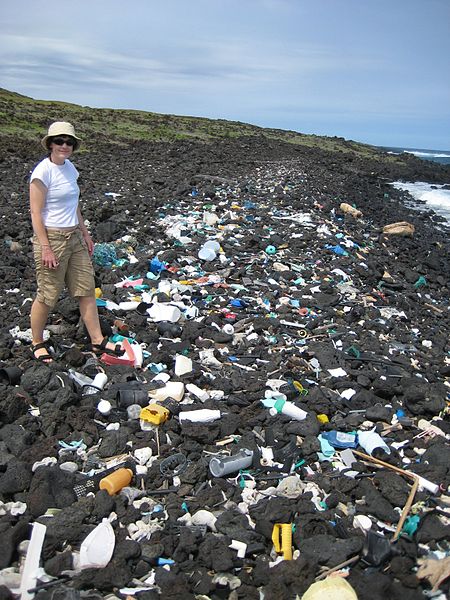
Photo credit: NOAA
Last week I was going to write about Algalita Marine Research Foundation and the plastic ocean, but alas, life had other plans for me. I was on my way to Cabrillo Marine Aquarium to attend a presentation by Captain Charles Moore and encountered a truck tire on the freeway. By the time I saw the tire, there wasn’t much time (three seconds) to do anything but drive over it, blowing out the two right tires on my car.
Thankfully, I was able to pull over to the right shoulder safely and call for a tow, but needless to say I missed the lecture. While I was waiting for the tow truck, seven other cars pulled to the right with flat tires. Then a CHP officer stopped all the cars on the freeway and picked up the truck tire, putting an end to the flat tire episode.
So here is a very abbreviated version of what I wanted to write. Algalita Marine Research Foundation is an organization dedicated to researching plastic pollution and understanding its impact on the marine environment. I first heard about Algalita several years ago during a conversation about ocean conservation. I don’t remember who I was talking to, but I remember what they said, here’s the gist of the conversation:
Me: I had no idea there are so many problems with the ocean, there’s so much pollution!
Someone: Isn’t it terrible! Have you heard about the work Algalita is doing and the island of trash they discovered in the Pacific that’s the size of Texas?
Me: What? Alga-what? Really, an island of trash the size of Texas? How is that even possible?
Someone: Algalita, it’s an organization in Long Beach. Visit their website, you won’t believe all the trash they’ve found, you have to read about it.
After that conversation, I went home and looked up Algalita immediately and was appalled. It turns out that Algalita was founded by Captain Charles Moore in 1994 to restore coastal ocean habitat along California’s coast, but this changed after he discovered the Great Pacific Garbage Patch in 1997. (Read all about this discovery on the Algalita website.) Now Algalita focuses on researching plastic debris and its potential harmful health impacts on marine life and humans.
Since I first heard about Algalita at least seven years ago, marine debris and the plastic scourge has received a lot more press. Moore was interviewed for the Pulitzer Prize winning series on the Altered Oceans that ran in the LA Times in 2006, which is still worth reading if you haven’t. And awareness continues to grow about the excessive amount of plastic in the environment leading to plastic bag bans in many cities and counties. But I’m still amazed at how many people don’t know about the colossal plastic problem in our oceans.
So this is your chance to find out everything there is to know about the ongoing plastic plague (as Algalita so eloquently captures the problem): Read Moore’s just published book Plastic Ocean, which details his discovery of the Great Pacific Garbage Patch and his research on plastics in the ocean. This is one problem that isn’t going away that you need to know about. I had hoped to give you an update, but rubber road pollution is just as dangerous as plastic ocean pollution.
Note: The photo was taken by Eric Johnson, a NOAA employee, who added these comments, “Plastic debris littering Hawaiian shoreline. Hawaii is located near the center of the North Pacific gyre where debris tends to concentrate.”
Such a sobering bunch of statistics, but we need to know it. And I am glad you were safe during the tough times on the road!
Pleased you are safe after your road hazzard but my dear,unfortunately I think you could find many a ‘plastic’ beach in several countries.
It’s how to get people to stop leaving their plastic trash in all the wrong places. Something many of us have new trying to do for a very long time. Person concerned.
Hi Glennys, Thanks for the comment! I completely agree, we have to educate people on how to dispose of trash. It’s seems like it should be such a simple task, but alas, trash keeps ending up in all the wrong places like you said. Thanks for your efforts, please don’t give up!
My husband and I live in Oregon. We keep large trash bags in the car so we have them when go to the coast. We always pick up trash as we walk along the beach. We have at times collected 2 large trash bags full of trash. I believe if everyone would pick up some trash it would help! We also need to figure out a way to make plastic biodegradable or stop making it altogether!
Thanks for all you are doing Elizabeth to help keep our oceans clean! I agree with you, we have to find an alternative to plastic. There is too much of it washing up on beaches all over the world.